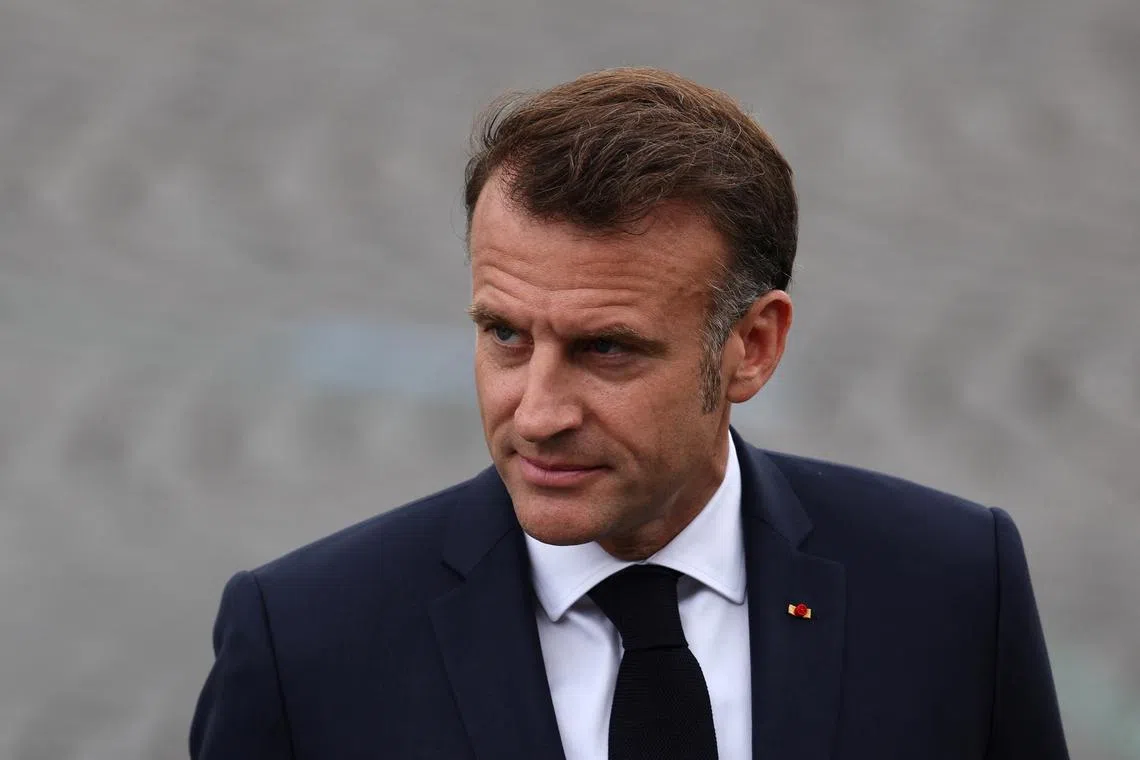Frustration, Gaza crisis drove Macron to go it alone on Palestine recognition
Sign up now: Get ST's newsletters delivered to your inbox

French President Emmanuel Macron was struck by the mounting humanitarian crisis when he visited an Egyptian town on the border with Gaza in April.
PHOTO: REUTERS
PARIS – President Emmanuel Macron’s announcement that France would become the first Western member of the UN Security Council to recognise a Palestinian state in September has caused diplomatic ructions from the Middle East through Europe to Washington.
But it did not come out of the blue.
When Mr Macron visited the Egyptian town of Al-Arish on the border with Gaza in April, he was struck by the mounting humanitarian crisis and made clear on his return home that Paris would soon opt for recognition.
Working with Saudi Arabia, Mr Macron came up with a plan to have France plus Group of Seven allies Britain and Canada recognise Palestinian statehood, while pushing Arab states to adopt a softer stance towards Israel through a UN conference. But despite weeks of talks, he failed to get others on board.
Three diplomats said London did not want to face the wrath of the US, and Ottawa took a similar stance, leaving Mr Macron to go it alone.
“It became increasingly apparent that we could not wait to get partners on board,” said a French diplomat, adding that France will work to get more states on board ahead of the conference on a two-state solution in September.
Domestically, Mr Macron was under rising pressure to do something amid widespread anger at the harrowing images coming out of Gaza. Although, with both Europe’s biggest Muslim and Jewish communities and a polarised political landscape, there was no obvious course of action that would satisfy all sides.
Israel and its staunch supporter the US have blasted France’s move
Mr Macron had discussed the matter extensively with both US President Donald Trump and Israeli Prime Minister Benjamin Netanyahu in advance.
Mr Trump said on July 25 that France’s decision did not “carry any weight”
Conference plan
French officials previously considered an announcement at a conference scheduled for June at the UN, co-hosted by France and Saudi Arabia, to sketch out a road map to a viable Palestinian state while also ensuring Israel’s security. But the conference was postponed amid intense US diplomatic pressure and after Israeli air strikes on Iran.
Mr Macron’s announcement on July 24 is linked to a rescheduled and rejigged version of the UN conference, now scheduled to take place on July 28 and 29.
That meeting will be at ministerial level, but Paris decided it would hold a second event with heads of state and government on the sidelines of the UN General Assembly in September, where Mr Macron will announce formal recognition.
Some analysts say Mr Macron has used the carrot of recognition to extract concessions from Mr Mahmoud Abbas, the president of the Palestinian Authority, which is a moderate rival to Hamas, and other regional players.
“Macron here is acting as a catalyst to get the Palestinians to deliver on the needed reforms, to get the Arabs to deliver on a stabilisation force and the disarming of Hamas,” said Ms Rym Momtaz, editor-in-chief of the Strategic Europe blog run by the Carnegie Europe think-tank.
Others say that while recognition has symbolic value, there will still be no functioning Palestinian state whenever the war in Gaza comes to an end.
“Recognition by a European heavyweight like France is indicative of the rising frustration with Israel’s intransigent policies,” said Mr Amjad Iraqi, senior analyst at International Crisis Group.
“What’s the point of recognising a state if they’re doing little to stop it from turning into ruins?”
French officials point to months of intense Israeli lobbying to try to prevent Mr Macron’s move – and Mr Netanyahu’s fierce criticism of it – as evidence that it matters a lot to Israeli leaders.
Sources familiar with the matter say Israel’s warnings to France had ranged from scaling back intelligence-sharing to complicating Paris’ regional initiatives – even hinting at possible annexation of parts of the West Bank.
But French officials concluded that Mr Netanyahu would do whatever he thought was in his interests in the West Bank anyway, regardless of what France did on recognition.
Israel’s Parliament voted on July 23 in favour of a non-binding declaration urging the government to apply Israeli law to the West Bank, widely seen as a de facto annexation of the territory. That added to the urgency in Paris.
“If there is a moment in history to recognise a Palestinian state, even if it’s just symbolic, then I would say that moment has probably come,” a senior French official said. REUTERS


